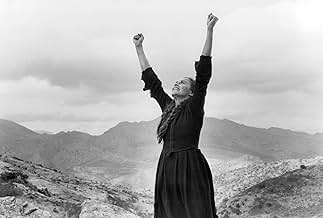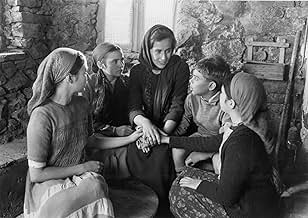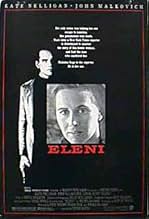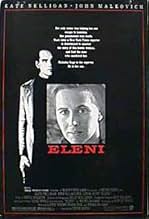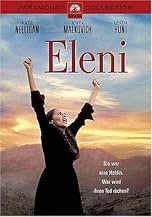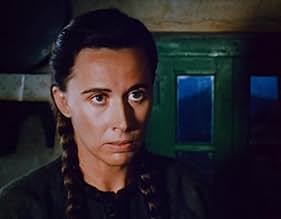VALUTAZIONE IMDb
6,9/10
1751
LA TUA VALUTAZIONE
Aggiungi una trama nella tua linguaA mother's love for her children leads to a son's revenge for her death in this dramatic thriller that begins during the Greek civil war.A mother's love for her children leads to a son's revenge for her death in this dramatic thriller that begins during the Greek civil war.A mother's love for her children leads to a son's revenge for her death in this dramatic thriller that begins during the Greek civil war.
Recensioni in evidenza
This film seems to have unjustly attracted a lot of nonsensical comments, mostly from left of center commentators; and it's sadly revealing how the facts cited by other viewers are not even addressed, but simply ignored by the left-ist commentators. Those who accuse the film of being anti-communist propaganda mostly use ad hominem arguments, and insult and invective. But ask yourself: what good is a political view which assumes itself (because it is self-described as "revolutionary") to be above ordinary moral or political criticism? If that were true, then there could never be any way to judge the value of the actions performed in its name.
In short, this is a reasonably good film, with a fine performance by Kate Nelligan, and much less good work by other members of the cast. The direction is not inspired, and the flashback structure of the film seeks to maximize the emotional effects without stopping to consider just how powerful those effects are all by themselves, that is, the use of that structure betrays the fear of the film-makers that the story might not have the impact they wanted it to have.
The original book is stronger, but it too is flawed by Nicholas Gage's failure to ask himself about how it was that the communists picked on his mother, even though he presents some of the evidence that answers the question. It's clear from the book that some members of his family -- I think his grandfather, but it's been a long time since I read the book -- had serious disputes with other people in the village in the 20s and 30s and perhaps even earlier, and that there may even have been a murder involved; naturally, Gage is not all that clear on the point. The communists, men, most of them, couldn't go after the grandfather, so, brave souls that they were, went after the most vulnerable: the Gage womenfolk. Despicable, but that is often the tenor of village and peasant life.
And to me, this was the message of the book, that the politics of revolution were, in many cases, simply another weapon in the never-ending village war between its own members. The problem with the film is that it never really clarifies this central aspect of the drama, and so the power of Nelligan's performance is marooned. It affects, but it's almost in a vacuum, and Malkovich's portrayal of Gage, which I thought quite good, is similarly detached; but the flaw lay in the original book, which ducks important questions because Gage, North American that he is, simply doesn't understand the deeper currents of village life.
Worth a look, no matter its flaws. No work of art is ever perfect, and this one gets high marks for trying.
In short, this is a reasonably good film, with a fine performance by Kate Nelligan, and much less good work by other members of the cast. The direction is not inspired, and the flashback structure of the film seeks to maximize the emotional effects without stopping to consider just how powerful those effects are all by themselves, that is, the use of that structure betrays the fear of the film-makers that the story might not have the impact they wanted it to have.
The original book is stronger, but it too is flawed by Nicholas Gage's failure to ask himself about how it was that the communists picked on his mother, even though he presents some of the evidence that answers the question. It's clear from the book that some members of his family -- I think his grandfather, but it's been a long time since I read the book -- had serious disputes with other people in the village in the 20s and 30s and perhaps even earlier, and that there may even have been a murder involved; naturally, Gage is not all that clear on the point. The communists, men, most of them, couldn't go after the grandfather, so, brave souls that they were, went after the most vulnerable: the Gage womenfolk. Despicable, but that is often the tenor of village and peasant life.
And to me, this was the message of the book, that the politics of revolution were, in many cases, simply another weapon in the never-ending village war between its own members. The problem with the film is that it never really clarifies this central aspect of the drama, and so the power of Nelligan's performance is marooned. It affects, but it's almost in a vacuum, and Malkovich's portrayal of Gage, which I thought quite good, is similarly detached; but the flaw lay in the original book, which ducks important questions because Gage, North American that he is, simply doesn't understand the deeper currents of village life.
Worth a look, no matter its flaws. No work of art is ever perfect, and this one gets high marks for trying.
A story about the love of family and how strong political opinions can make people monsters, helped by personal gains.
Found the back and forth in time a little confusing.
The scenery and settings were beautiful and convincing, the actual scenes were heart wrenching and I felt the agony of the characters.
I was so sad that it wasn't possible to watch this in Greece (but was able to watch abroad), because of the fanaticism of the supporters of a certain political group.
The 1945 to 1949 civil war in Greece still raises heavy debates, partly because the Communists lost and the losers seem to attract some sympathy from ordinary people.
Found the back and forth in time a little confusing.
The scenery and settings were beautiful and convincing, the actual scenes were heart wrenching and I felt the agony of the characters.
I was so sad that it wasn't possible to watch this in Greece (but was able to watch abroad), because of the fanaticism of the supporters of a certain political group.
The 1945 to 1949 civil war in Greece still raises heavy debates, partly because the Communists lost and the losers seem to attract some sympathy from ordinary people.
Stunning performances by Kate Nelligan and most of the cast in this powerful story, based on truth, help make this a must-see film.
I wonder if some of the reviewers, such as onceuponatime500, really saw the movie, or if they just wrote from some vicious and preconceived bias.
The communists come to the village to conscript -- kidnap -- children to become guerrilla fighters. The mother, Eleni, takes a drastic step, mutilating her oldest child to spare her from being shanghaied into the communist forces.
Being communists, they will not be thwarted, not by any such reactionary notions as self-ownership, or freedom, or parental rights, or any of that silly stuff: They take the next oldest girl instead.
Eleni loves her children and believes, foolishly according to onceuponatime500, but in line with what Charlie Anderson (James Stewart) in "Shenandoah" said: They're my children, not the state's, not some murderous movement's.
For years after seeing this powerful and haunting story, I could recall Nelligan's last scene and be moved to tears.
The agony Eleni went through was duplicated millions of times in the bloody 20th Century, as some government or another, or some tyrannical movement or another, kidnapped young people to force them to risk their lives for some cause most of them didn't understand, much less support.
Think Viet Cong, think Hitler's armies, think Stalin's and Mao's imperialist and aggressive armies, and, yes, think of the poor draftees from the United States.
Think, contrastingly, of parents, parents who spent years loving and caring for their children, hoping those children would be able to live to a better adulthood than their parents. Think of those parents seeing their children sometimes literally torn from their grasp, thrown into lines to be cannon fodder for cruel warlords -- communists, Nazis, imperialists of one kind or another, even when disguised as crusaders.
"Eleni" works at almost every level except for the incredibly horrible performance by John Malkovich.
If it hadn't been seen as anti-communist, even Hollywood would have honored "Eleni." But its being anti-communist made "Eleni" an outcast in that artistically and morally corrupted town. However, "Eleni" is powerful drama.
Added 25 November 2017: Watching "Eleni" on YouTube, I am wondering if my dislike of John Malkovich's performance is at least as much for how unpleasant he makes Nick Gage. As portrayed by Malkovich, Gage is rude, cold, aloof; he has no personality, doesn't respond to people, not even to his wife who asks questions. As performed by Malkovich, Gage's personality is enough to chase away a viewer.
We are now exactly 100 years after the Bolshevik revolution in Russia, an event that led to hundreds of millions of deaths, and destruction of entire nations, of entire peoples.
There is an irony in Nick Gage's working for The New York Times, which has been frequently pro-communist, and nearly always anti-anti- communist, with its Moscow correspondent Walter Duranty infamously painting a rosy picture of the Soviet Union during the time of the murderous monster Josef Stalin.
This century anniversary makes "Eleni" even more poignant and even more important.
I wonder if some of the reviewers, such as onceuponatime500, really saw the movie, or if they just wrote from some vicious and preconceived bias.
The communists come to the village to conscript -- kidnap -- children to become guerrilla fighters. The mother, Eleni, takes a drastic step, mutilating her oldest child to spare her from being shanghaied into the communist forces.
Being communists, they will not be thwarted, not by any such reactionary notions as self-ownership, or freedom, or parental rights, or any of that silly stuff: They take the next oldest girl instead.
Eleni loves her children and believes, foolishly according to onceuponatime500, but in line with what Charlie Anderson (James Stewart) in "Shenandoah" said: They're my children, not the state's, not some murderous movement's.
For years after seeing this powerful and haunting story, I could recall Nelligan's last scene and be moved to tears.
The agony Eleni went through was duplicated millions of times in the bloody 20th Century, as some government or another, or some tyrannical movement or another, kidnapped young people to force them to risk their lives for some cause most of them didn't understand, much less support.
Think Viet Cong, think Hitler's armies, think Stalin's and Mao's imperialist and aggressive armies, and, yes, think of the poor draftees from the United States.
Think, contrastingly, of parents, parents who spent years loving and caring for their children, hoping those children would be able to live to a better adulthood than their parents. Think of those parents seeing their children sometimes literally torn from their grasp, thrown into lines to be cannon fodder for cruel warlords -- communists, Nazis, imperialists of one kind or another, even when disguised as crusaders.
"Eleni" works at almost every level except for the incredibly horrible performance by John Malkovich.
If it hadn't been seen as anti-communist, even Hollywood would have honored "Eleni." But its being anti-communist made "Eleni" an outcast in that artistically and morally corrupted town. However, "Eleni" is powerful drama.
Added 25 November 2017: Watching "Eleni" on YouTube, I am wondering if my dislike of John Malkovich's performance is at least as much for how unpleasant he makes Nick Gage. As portrayed by Malkovich, Gage is rude, cold, aloof; he has no personality, doesn't respond to people, not even to his wife who asks questions. As performed by Malkovich, Gage's personality is enough to chase away a viewer.
We are now exactly 100 years after the Bolshevik revolution in Russia, an event that led to hundreds of millions of deaths, and destruction of entire nations, of entire peoples.
There is an irony in Nick Gage's working for The New York Times, which has been frequently pro-communist, and nearly always anti-anti- communist, with its Moscow correspondent Walter Duranty infamously painting a rosy picture of the Soviet Union during the time of the murderous monster Josef Stalin.
This century anniversary makes "Eleni" even more poignant and even more important.
I weep because my family is portrayed in this film. It reminds me of the pain they went through but refused to speak about. A story that received no fanfare but brought pain to many. I see through the eyes of the director and the words of Nick Gage what they went through. A beautiful, love letter to a strong mother.
I have seen this movie and it is very gripping and entertaining, unfortunately it does not tell the whole story of Greece and what the resistance actually was and who they were fighting. In particular this story is one that as usual suffers from lies of omission and the simplification of very complex political issues into good vs. evil. Perhaps Eleni was faced with an evil leader of the left, however do we know who and why the left was actually fighting. Quickly, Greece had a King and Aristocracy that was controlled by a military dictator before WWII, Greece was pivotal to British interests in Egypt (Suez Canal and Middle East Oil -Iran) and basically Great Britain backed this military dictator. When WWII broke out the king and dictator fled and it was the Greek people who fought the Germans and Italians, England actually fought with them at the end also. Problem, average Greek person did not want King or fascist dictator back (this is the communist group - which they were really leftist not Stalin communist). Greeks wanted to govern themselves and this is not what Great Britain - they wanted King and dictator back and guess who won . The King came back until the late 50's and 60's were Greek people won their independence. On mean idiot that was communist does not mean that all of the things the left was fighting for were wrong - this is pure and simple propaganda.
Lo sapevi?
- QuizAdditional flashback scenes were filmed featuring Alfred Molina as Nick's father Christos (played by Steve Plytas in the 1980s scenes). Although Molina was credited as "Young Christos" in press materials, and his scenes were shown in publicity photos, his role was almost completely cut from the final version, and his name does not appear in the credits. Molina's only remaining footage in the released film is a single shot of Christos taking a photograph of Eleni, Nikola and family, with his face partially obscured by his camera.
I più visti
Accedi per valutare e creare un elenco di titoli salvati per ottenere consigli personalizzati
- How long is Eleni?Powered by Alexa
Dettagli
Botteghino
- Budget
- 12.000.000 USD (previsto)
- Lordo Stati Uniti e Canada
- 305.102 USD
- Fine settimana di apertura Stati Uniti e Canada
- 27.875 USD
- 3 nov 1985
- Lordo in tutto il mondo
- 305.102 USD
- Tempo di esecuzione
- 1h 54min(114 min)
- Colore
- Mix di suoni
- Proporzioni
- 1.85 : 1
Contribuisci a questa pagina
Suggerisci una modifica o aggiungi i contenuti mancanti

